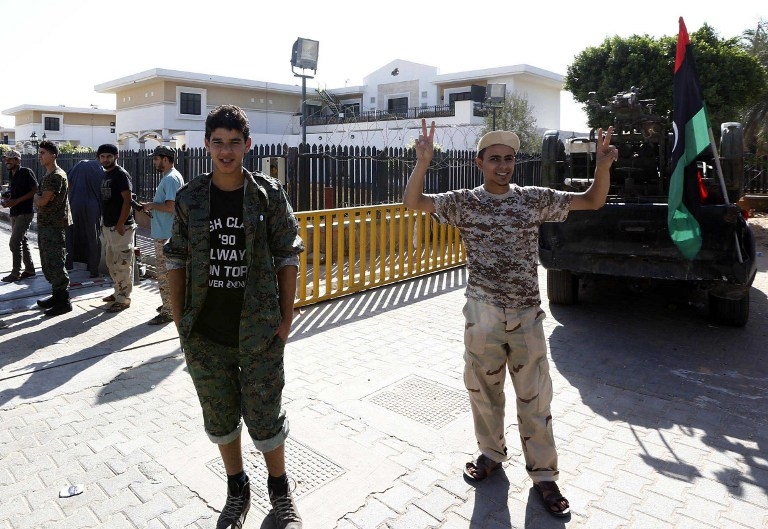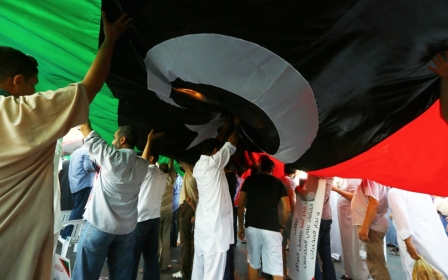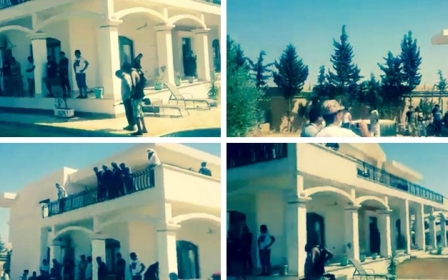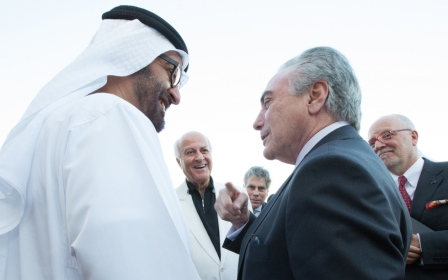False dawns and tattered dignity in Libya

Fighters from the Islamist-aligned Libya Dawn militia, which has seized control of Tripoli, have said that they plan to use the capital as a base to spread their revolutionary movement across civil-war-hit Libya.
Libya Dawn, led by forces from the northwestern port city of Misrata, last week took Tripoli from the Zintan Brigades, so-called because they hail from the western mountain town of Zintan. The former have since focused on establishing control by setting up operation rooms and checkpoints in the south-west of the city.
“I think that being in control of the capital gives us a good place to start sorting out the rest of Libya,” Mosbah Bla’au, an operation's room worker, told Middle East Eye.
Bla’au was bemused by a UN resolution last week that called for sanctions against those involved in the recent outbreak of violence, as well as an immediate ceasefire.
“It is unclear what the UN means. What do they expect us to do if we come under attack? Stand and watch?” he said.
Bla’au said his movement is dismayed at the international community’s reaction to the latest surge in violence because they see their struggle as a continuation of the revolt that overthrew Muammar Gaddafi in 2011.
“The world supported us then, so why not now?” he asked. “We are fighting for the revolution so many of our sons died for. We will continue to defend it from anyone."
The Zintan forces that Libya Dawn ousted from Tripoli are aligned with the rogue general Khalifa Haftar, who earlier this year launched an anti-Islamist offensive called “Operation Dignity” from his base in Benghazi in eastern Libya.
Bla’au condemned the air strikes that killed 24 Libya Dawn fighters on 18 August, which the US says was carried out by Egypt and the UAE. Some critics saw the strikes as a sign that Libya Dawn are gaining an upper hand over Haftar’s forces.
The battle for Tripoli is won, he said, but the war is not over as “the militias who controlled south-west Tripoli have fled to the south and the west of the city”.
“They will be rallying and gathering strength, but our forces are ready for any counter-charge,” he added.
Haftar’s forces are backed by some of the Libyan state’s special and air forces, as well as other tribal militias. His movement's main aim is to rid Libya of Islamist militias such as Ansar al-Sharia - a militant group that has assassinated hundreds of Libyan army and police officers over the past two years and welcomed the Libyan Dawn operation when it came on the scene.
Al-Sharia were also labelled a terrorist organisation by the US government for their involvement in an attack on the US consulate in Benghazi in 2012 that killed ambassador Chris Stevens.
Libya Dawn’s victory in Tripoli means that Misratan militias can roam freely in the capital for the first time since last November, when anti-militia protesters from Tripoli clashed with Misratan forces in the Gargour district near Gaddafi’s famous Bab al-Aziziya compound.
Protests that started peacefully ended with Misratan militias firing indiscriminately at the demonstrators, according to witnesses.
"They hit protesters and even people driving past who had nothing to do with the protest," said Salah, a real-estate lawyer who was at the demonstrations. “Almost 50 people were killed."
The Misratan militias were ousted from Tripoli and forced back to Misrata two days after the protest. This May, they returned after Zintan forces attacked the Islamist-dominated General National Council (GNC), then the country's parliament, in support of Haftar.
Four months later, Libya Dawn, which has ties to Ansar Sharia, but is viewed as less radical, said that the group has completely “liberated” the city from the Zintan Brigades. However, not all the city’s residents agree with that appraisal.
“We are sick of militias ‘liberating’ us," Salah said.
Salah said his life was now at risk because of his involvement in the demonstrations.
“I no longer have the will to live here in Libya. I want to leave,” he said as he looked at his young daughter playing on the couch next to her mother. “I want my family to be safe."
False promise
Salah fought in the revolution that toppled dictator Muammar Gaddafi. Back then, the Zintan and Misrata forces played a prominent, joint role in what started as a fight for freedom. But the past three years have seen the two groups drift apart.
“I have friends and colleagues on both sides,” said Salah. “But, what these militias are doing now is worse than anything I saw from Gaddafi’s forces in 2011."
The Misrata militias have already started ransacking the city and are searching for anyone who might oppose them, with dozens arrested and the homes of anyone allied to Haftar or the Zintan Brigades torched.
Salah points to a burnt-out building he said was destroyed by Misrata militias.
“It was the home of a man from Zintan who had nothing to do with the fighting,” said Salah from his car. Although the building was only a few hundred metres away from his home, he still felt it was too dangerous to stay there.
“For the past three days they [Misratan militias] have been patrolling the area,” said Salah.
Salah said only foreign intervention can stop the fighting, referring to the US embassy’s evacuation in July. “When they [the US embassy staff] left, all it took was just a few jets in the air and not one bullet was fired - the militias fear them [foreign forces],” he said.
“If they sent over a couple of F16s or whatever you call those jets they will run away,” said Salah, “you don’t even have to target them, just their weapons and ammunition."
The state’s army and police forces are too weak to defeat the militias, he said. “But if you take away their heavy weapons, it would be a different story.”
The hope for democracy that many Libyans were promised post-Gaddafi now seems ever more remote, and the political scene is in as much chaos as the security situation.
The Libya Dawn militias who took control of Tripoli are pushing for a reinstatement of the previous Islamist-controlled parliament - the GNC.
However, a newly elected and anti-Islamist dominated parliament - the House of Representatives (HoR) - has been meeting for a month in the Haftar-controlled city of Tobruk in Libya's northeast.
The call for the GNC to be reinstated led to a statement from the HoR describing the Libya Dawn and its Islamist militia allies as terrorist organisations.
The UN has met with all sides of the political and military conflict, but has emphasised that it only recognises the HoR as the legitimate body in control of Libya.
With the HoR and GNC not listening to each other on the political front, and Libya Dawn, Operation Dignity and other militias determined to stay their ground, it could be a while before Libya is stable again and until Salah - who is still looking for a way out of his country - can walk the streets of his neighbourhood safely again.
New MEE newsletter: Jerusalem Dispatch
Sign up to get the latest insights and analysis on Israel-Palestine, alongside Turkey Unpacked and other MEE newsletters
Middle East Eye delivers independent and unrivalled coverage and analysis of the Middle East, North Africa and beyond. To learn more about republishing this content and the associated fees, please fill out this form. More about MEE can be found here.




